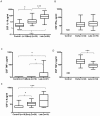Stage progression and neurological symptoms in Trypanosoma brucei rhodesiense sleeping sickness: role of the CNS inflammatory response
- PMID: 23145191
- PMCID: PMC3493381
- DOI: 10.1371/journal.pntd.0001857
Stage progression and neurological symptoms in Trypanosoma brucei rhodesiense sleeping sickness: role of the CNS inflammatory response
Abstract
Background: Human African trypanosomiasis progresses from an early (hemolymphatic) stage, through CNS invasion to the late (meningoencephalitic) stage. In experimental infections disease progression is associated with neuroinflammatory responses and neurological symptoms, but this concept requires evaluation in African trypanosomiasis patients, where correct diagnosis of the disease stage is of critical therapeutic importance.
Methodology/principal findings: This was a retrospective study on a cohort of 115 T.b.rhodesiense HAT patients recruited in Eastern Uganda. Paired plasma and CSF samples allowed the measurement of peripheral and CNS immunoglobulin and of CSF cytokine synthesis. Cytokine and immunoglobulin expression were evaluated in relation to disease duration, stage progression and neurological symptoms. Neurological symptoms were not related to stage progression (with the exception of moderate coma). Increases in CNS immunoglobulin, IL-10 and TNF-α synthesis were associated with stage progression and were mirrored by a reduction in TGF-β levels in the CSF. There were no significant associations between CNS immunoglobulin and cytokine production and neurological signs of disease with the exception of moderate coma cases. Within the study group we identified diagnostically early stage cases with no CSF pleocytosis but intrathecal immunoglobulin synthesis and diagnostically late stage cases with marginal CSF pleocytosis and no detectable trypanosomes in the CSF.
Conclusions: Our results demonstrate that there is not a direct linkage between stage progression, neurological signs of infection and neuroinflammatory responses in rhodesiense HAT. Neurological signs are observed in both early and late stages, and while intrathecal immunoglobulin synthesis is associated with neurological signs, these are also observed in cases lacking a CNS inflammatory response. While there is an increase in inflammatory cytokine production with stage progression, this is paralleled by increases in CSF IL-10. As stage diagnostics, the CSF immunoglobulins and cytokines studied do not have sufficient sensitivity to be of clinical value.
Conflict of interest statement
The authors have declared that no competing interests exist.
Figures

References
-
- Kabore J, Koffi M, Bucheton B, MacLeod A, Duffy C, et al. (2011) First evidence that parasite infecting apparent aparasitemic serological suspects in human African trypanosomiasis are Trypanosoma brucei gambiense and are similar to those found in patients. Infection Genetics and Evolution 11: 1250–1255. - PubMed
-
- Sternberg JM, Maclean L (2010) A spectrum of disease in human African trypanosomiasis: the host and parasite genetics of virulence. Parasitology 137: 2007–2015. - PubMed
Publication types
MeSH terms
Substances
Grants and funding
LinkOut - more resources
Full Text Sources
Research Materials

